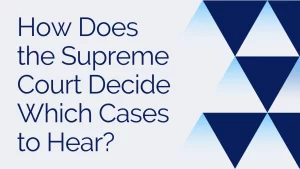How to Win an Appeal in Court
Understand the Appeals Process
The first key to winning an appeal is understanding the appeals process and the grounds on which a verdict or lower court decision can be challenged. An appeal is not a retrial, so you cannot simply argue that the jury or judge got the facts wrong. Instead, you must show that specific legal errors were made that impacted the outcome or violated your rights.
Five Ways to Win an Appeal in Court
Be Proactive: Initiate an Appeal Immediately After Receiving an Adverse Ruling
Timelines and Deadlines
Appeals are subject to strict deadlines. One of the biggest mistakes that you can make in the appeals process is waiting too long to take action. How much time you will have to initiate your appeal—usually done through the filing of a document called a Notice of Appeal—depends on several factors, including your state and the type of case. Regardless, it is important to start the appeals process as soon as possible to avoid losing your right to appeal.
Get the Process Started
This means that you should take action as soon as you receive an adverse ruling, even if you do not have all the facts and details gathered yet. You can always supplement your appeal with additional information later. The key is to get the process started so that you do not run out of time.
Supplement Later You can always supplement your appeal with additional information later. The key is to get the process started so that you do not run out of time.
Consult With an Appellate Lawyer as Soon as Possible
Specialized Area of Law
Appellate law is a specialized area of law. Whether you are navigating a civil appeal, family court appeal, or criminal appeal, there are unique rules, regulations, and procedures that will apply to the case.
Civil Appeals
It is imperative that you are represented by an attorney who has appellate law experience for civil appeals.
Family Law Appeals The same goes for family law appeals. You need an experienced appellate lawyer.
Criminal Appeals Criminal appeals also require an appellate law specialist.
Determine, Preserve, and Raise All Grounds for Appeal
The Appeals Process
The American Bar Association (ABA) explains that an appeal is neither a new trial nor a re-trial. Quite the contrary, an appellate court is restricted largely to only reviewing issues that were already raised in the “record.”
Procedural or Legal Errors Appeals courts generally do not accept new evidence nor do they hear new testimony. Instead, the appellate process exists to remedy serious procedural or legal errors.
Submit a Persuasive, Well-Supported Appellate Brief
Opportunity to Make Your Case As simply described by the Judicial Branch of California, an appellate brief is a “written description of the facts in the case, the law that applies, and the party’s argument about the issues on appeal.” It is your opportunity to make your case on appeal.
Components of an Appellate Brief
A strong appellate brief could be the difference between winning and losing your case on appeal.
Know the Possible Outcome and Be Ready to React
Potential Outcomes
What happens if you successfully appeal a criminal, civil, or family law case? The answer depends on many different factors. Indeed, there can be several different outcomes for a successful appeal. You need to be ready to react to any potential outcome.
Be Prepared The appellate court may affirm the decision of the lower court (unsuccessful appeal), and you may or may not have additional options. The court may reverse and remand the decision (successful appeal), which means that the case will proceed to the next steps. An appellate lawyer can help you plan all possible outcomes.
Conclusion
Having a judge rule against you in a court of law is never a desired outcome. However, a judge’s decision does not always have to be final, and there are sometimes ways to appeal the decision and try to obtain a ruling in your favor. An appeal is a complex process, so be sure to follow the key strategies outlined above to improve your chances of a favorable outcome.
FAQs
What is an appeal?
An appeal is a request for a higher court to review a court decision and potentially reverse or change the outcome.
When should I file an appeal?
You should file an appeal immediately after receiving an adverse or unfavorable ruling in your case. There are strict deadlines so it is important to act fast.
What happens after I file my appeal? After you file your appeal, you will submit an appellate brief detailing why the lower court ruling should be overturned. The other party will also submit a brief. Then the appeals court will review arguments from both sides and issue a new ruling.
How often are appeals successful? Between 5-15% of appeals lead to the lower court’s ruling being overturned, depending on the specifics of the case. But having an experienced appellate lawyer increases your chances.
What are the possible outcomes of my appeal?
The appeals court may affirm the lower court ruling, overturn it and rule in your favor, send it back with instructions for corrections, or some combination of those outcomes. Be prepared for any result.
What percentage of appeals succeed?
Overall statistics show between 10-20% of appeals result in the lower court ruling being completely overturned. About 30-40% of appeals result in some sort of modification or remand for further proceedings in the lower court.
How much does it cost to appeal?
The costs of an appeal can vary substantially depending on the complexity and size of the record but expect to spend at least $20,000 to $30,000 including legal fees and transcript costs.
Can I represent myself in an appeal?
Yes, it is possible to handle your own appeal though the rules of appellate procedure are technical and complex so having experience with appeals or at least assistance from an attorney is highly recommended.
What happens if I win the appeal?
If you win the appeal, the case will either be sent back to the lower court for a new trial or other further proceedings, or the original judgement will be reversed or modified, depending on the circumstances.
Is winning an appeal final?
An appellate decision may or may not be the final say in the case. In some situations, particularly appeals from intermediate appellate courts, there may be opportunities to request further review by a higher court through another layer of appeal.








